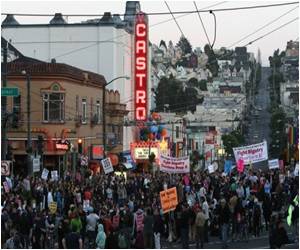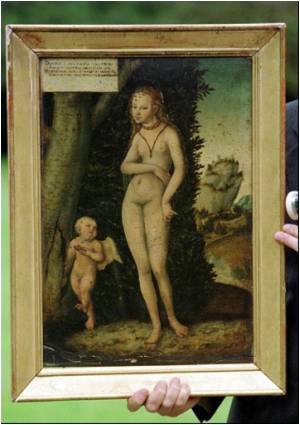Amanda, assuming her saucy alter ego, gets on stage and strips off her clothes as part of the growing US burlesque movement though by day she is an accountant.

"Getting naked in front of people has given me the confidence that I never had," said Amanda, 28, before going on stage at the Black Cat, a concert hall in Washington that sometimes hosts burlesque shows.
"My family is absolutely not ok with it," quipped the young performer.
"My parents are very staunch Republicans; they're very close-minded people," she said.
On stage Amanda is light years away from the southern town where she lives. As "Ellie Quinn" she arrives on stage squeezed into a dress that highlights her voluptuous curves and wearing a stylized blond wig.
But her performance aims at more than just a saucy striptease. As "Ellie Quinn" strips defiantly against a backdrop of bad music, a message written across her back is revealed. "One size doesn't fit all," it says.
Advertisement
Performance over, Ellie Quinn doesn't leave the stage totally naked.
Advertisement
"We have this joke where, unlike a burlesque artist, a stripper actually makes enough money to pay the rent," said Danielle who goes by the stage name "Gigi Halliday".
- 'It's art!' -
The cabaret aspect of burlesque is first and foremost, performers and producers said, arguing that total nudity is not the objective.
Since it began, burlesque was intended as "a parody: it was telling a story, it was the theatrical part of strip tease. And that's what it still is," said Melina Afzal, who produces burlesque shows in Washington.
Humor and provocation are critical aspects, she said.
"People are not comfortable with nudity in America, but they are intrigued. They want to see it, but they don't really know what to do with it. For us it's very empowering," said Asha, known as "Cherokee Rose".
Hiding behind feathers as she undresses on stage, the young woman's act is reminiscent of Josephine Baker, the dancer-singer-actress who became a star for her erotic dancing in 1920s Paris.
Burlesque had its heyday at the beginning of the 20th century, survived Prohibition, and went out of fashion in the 1960s.
Its strong renaissance a dozen or so years ago was spurred by the movies "Moulin Rouge" in 2001 and "Burlesque" in 2010 starring Cher and Christina Aguilera.
In Washington, alone, more than a half dozen venues offer burlesque shows.
"We are running into saturation problems at least on the East Coast -- too many shows, too many producers," said Afzal.
Its popularity is owed without a doubt to its "safe and sexy" air, she says. "It's non-judgmental."
At the Black Cat, the audience is all smiles and appreciative whistles as soon as a bra hits the floor.
But Clark, a forty-something who came with his companion Sheryl, said he wasn't only there to see dancers take off their clothes.
"I am Canadian, so I know Americans don't strip off" all their clothes, he joked.
"It's art! Yes, it's artistic" Sheryl said with a laugh.
Source-AFP








